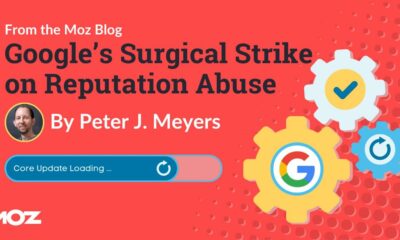SEO
Website Traffic Down? Maybe It’s Not Your Fault
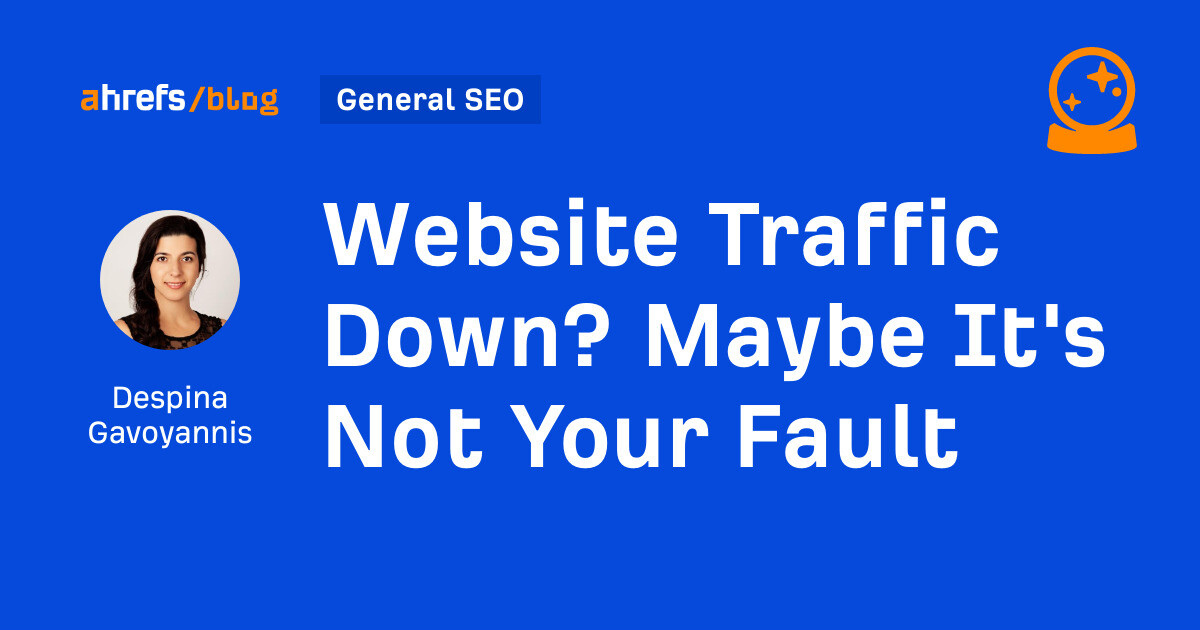
If your site has lost traffic, it’s natural to wonder what you’re doing wrong. But what if it’s not your fault?
Let’s be real. Most of the time, it’s likely that it is your fault in some way. You may have site or content quality issues you were unaware of or low-quality links dragging down performance.
However, assuming it’s always your fault can be harmful. If you try to “fix” issues that aren’t really there, it can backfire and do more harm than good. Sometimes, losing traffic is truly not your fault and is genuinely out of your control.
Here are the top three reasons for traffic losses that aren’t your fault and how you can respond to them.
If your top competitors are all experiencing similar traffic losses to you, then this is your first clue Google might be stealing your traffic.
To see if this is happening, plug your website into Site Explorer and add your main competitors to the organic search traffic graph in the Overview report.
If the graph looks like this, then Google is favoring an emerging competitor:
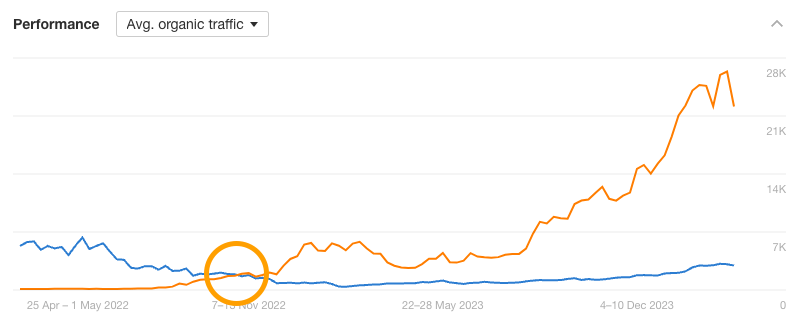

If this is what you’re seeing, Google is not stealing your traffic. You need to do some competitive intelligence and figure out what your competitor is doing better than you.
But if you see a graph like this where most, if not all, competitors’ traffic drops at the same time as yours, that’s a good sign Google is stealing your traffic:
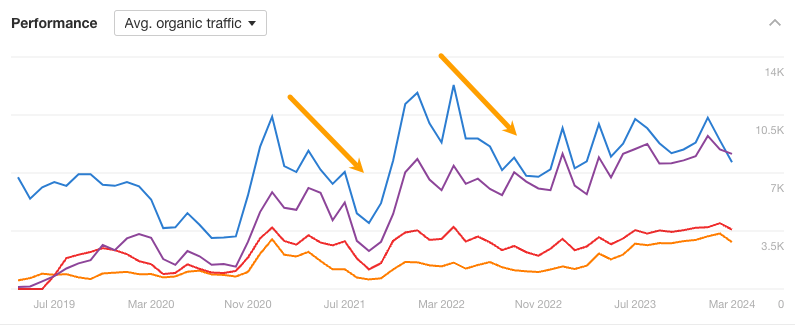

To double-check that this is the case, you need to dig a little deeper by asking these questions:
- Has Google changed the visibility of ads above the fold?
- Has Google introduced a new organic SERP feature above organic results?
- Has Google pushed organic results further down on mobile searches?
- Has Google changed the design of organic results which may affect click-throughs?
If you answered yes to any of these, then Google is likely pinching your traffic.
If you’re not sure if any of these may be at play, here’s how to find out. Start by entering your main keyword into Ahrefs’ Keyword Explorer. Let’s use “gardening” as the example keyword.
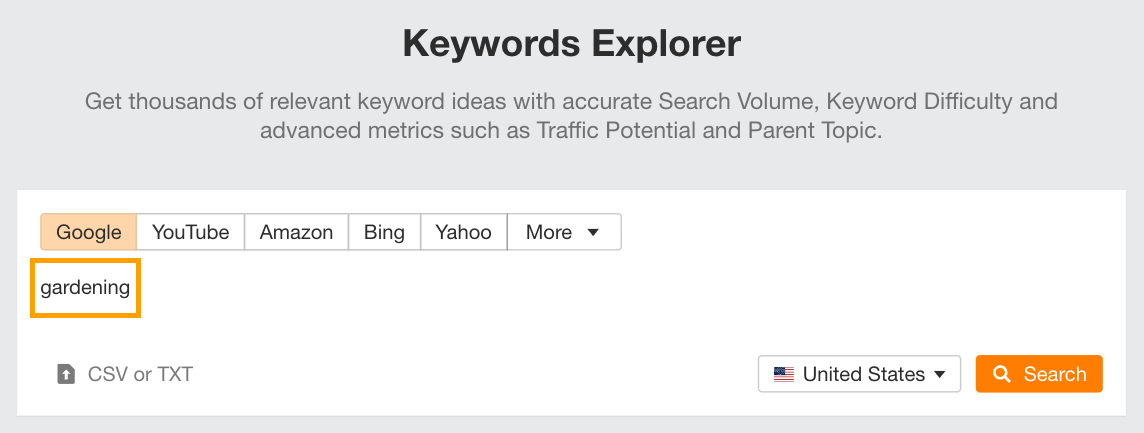

Then, scroll to the SERP comparison view. Enter two dates to compare, ideally from a few days before the drop vs a few days after, though you can choose any timeframe that makes sense for your analysis.
Here’s an example with a year-over-year comparison:
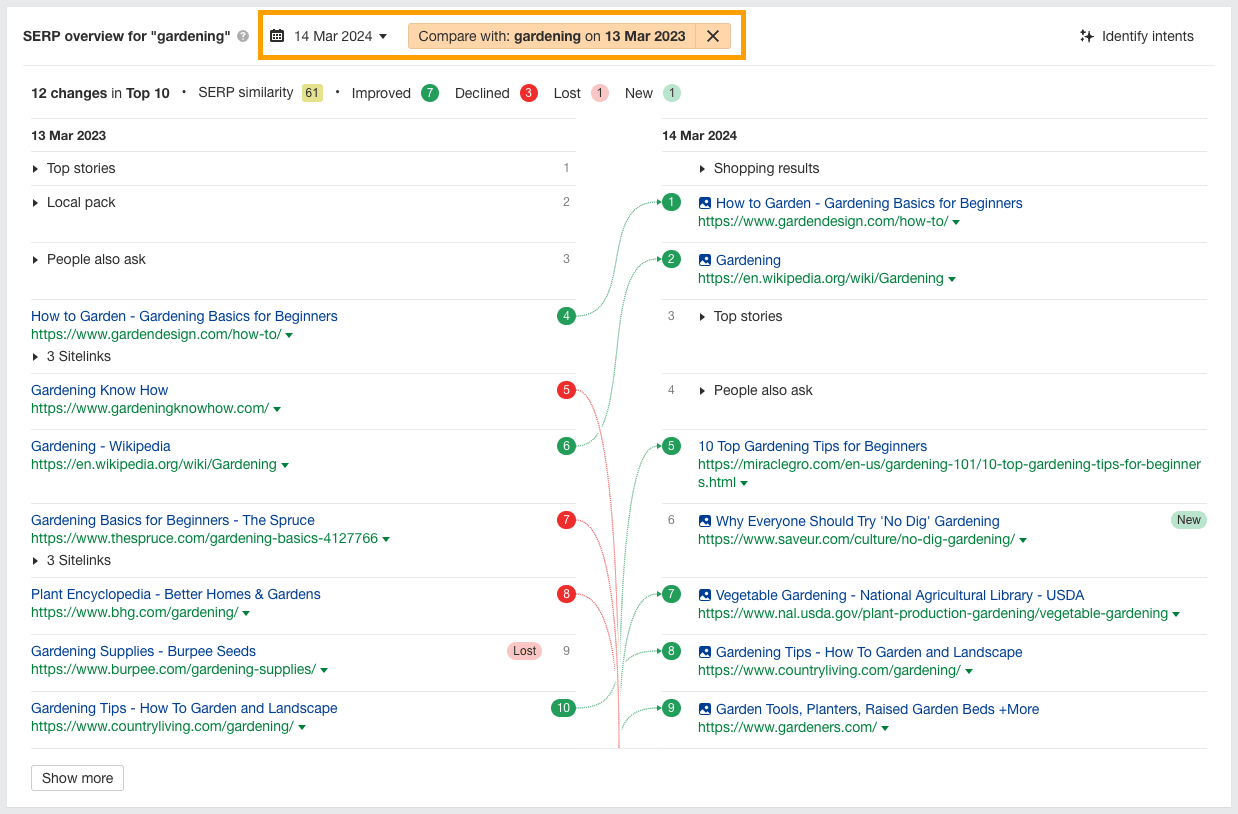

Make note of any changes to the SERP features present and the order they appear in. For instance, from the above example, you can observe all of the following UI changes Google has made:
- Removal of the local search pack
- “Top stories” bumped down to position 3
- “People also ask” bumped down to position 4
- Shopping results taking up above-the-fold real estate
- Prominence of more images in the SERPs
You can also go a little deeper here by checking the visual layout of the SERPs.
For instance, you can do some sleuthing in Wayback Machine to get a feel for what the search results looked like with the local pack:
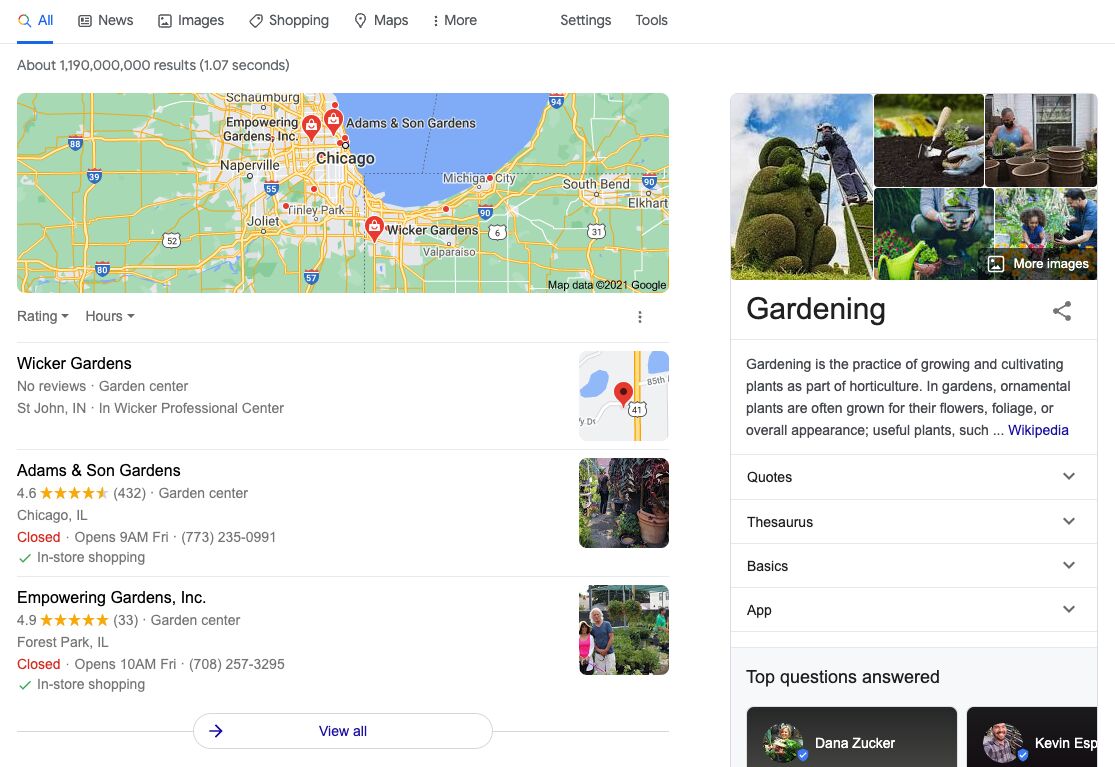

Admittedly, there will be some data gaps here as not every keyword search is recorded by the Wayback Machine, but many popular, evergreen terms should have some historical snapshots.
You can then compare these to the live SERPs, especially the above-the-fold region, which for the “gardening” example now looks like this:
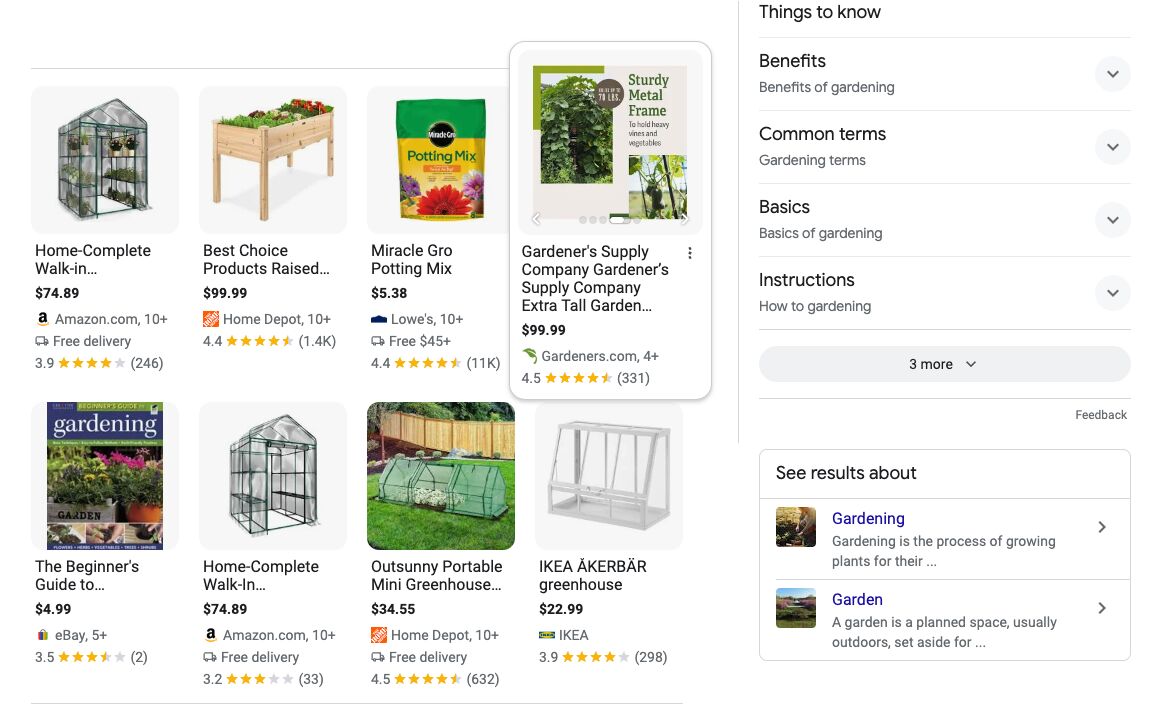

What’s even more interesting is that instead of each product tile linking off to the website it displays, Google opens up a panel in its own interface instead:
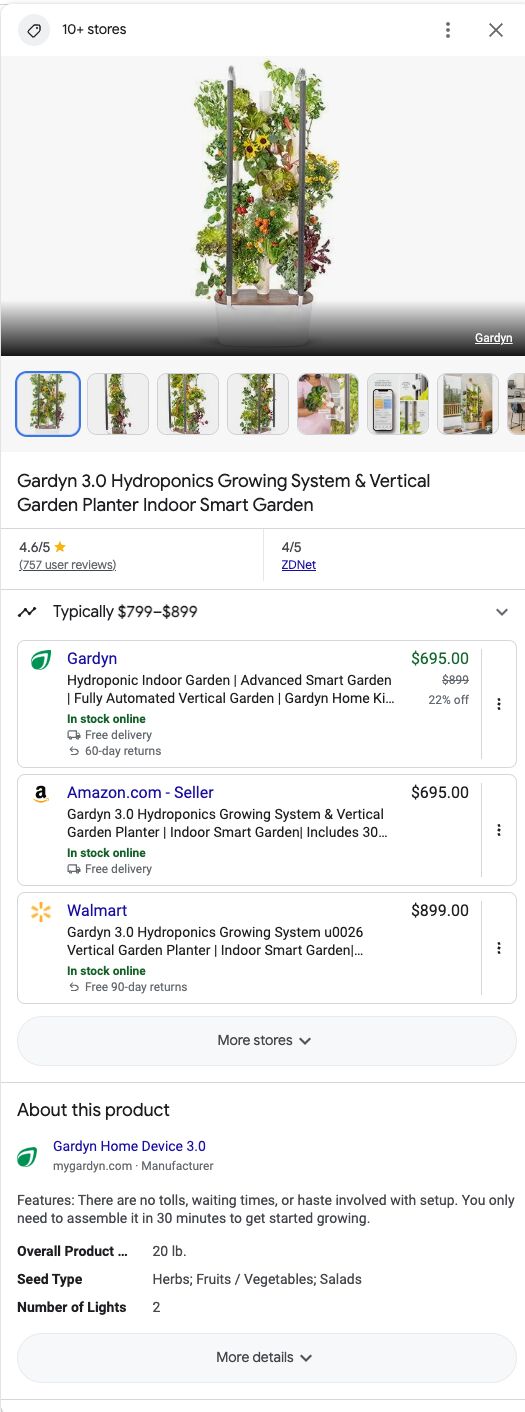

If your site ranked in local results for this keyword, that’s a traffic loss you won’t be able to recover, no matter how much effort you put into it.
Likewise, if you feature in the “Top stories” or “People also ask” sections, it’s likely difficult to reclaim your traffic since they’ve been bumped so much lower on the page (which correlates to a lower click-through rate).
And even for the supposed “winners” in this situation—the ecommerce brands with products featured in the new SERP results—Google is inserting itself in the conversion process and directing less traffic to their product pages to keep more people on its platform.
So if you’re losing traffic to Google, it’s likely to be difficult for you to reclaim this traffic because:
- It’s difficult to show up for every new feature Google releases.
- Many times, new features won’t make sense for your business model.
- Google is increasingly inserting itself in the middle of more conversion journeys.
Rather, you may be better off looking at Google’s bigger-picture objective and aligning with that. In the gardening example, it would be a case of accepting traffic losses for this specific keyword but then finding the topics and content formats where there is new growth potential instead.
To do this, you can check out the keyword forecasts for topics in Keywords Explorer and isolate content angles that are a good fit for your business.
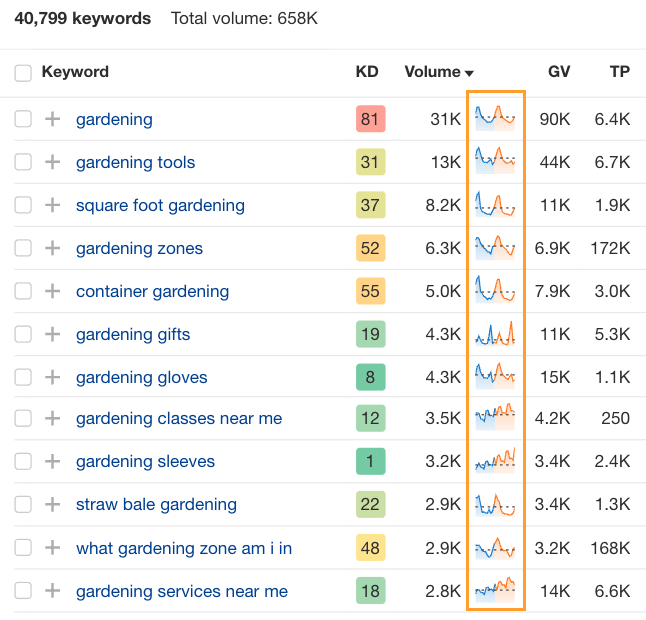

Many people use the same phrases but are looking for different things. When this happens en masse, it could trigger an intent switch where Google changes the layout and types of results returned.
For example, let’s look at the topic of “conservatorship.” Before Britney Spears’ legal drama became a popular topic for gossip magazines, people mainly searched for this term looking for legal definitions and advice.
The top of the SERPs looked like this:
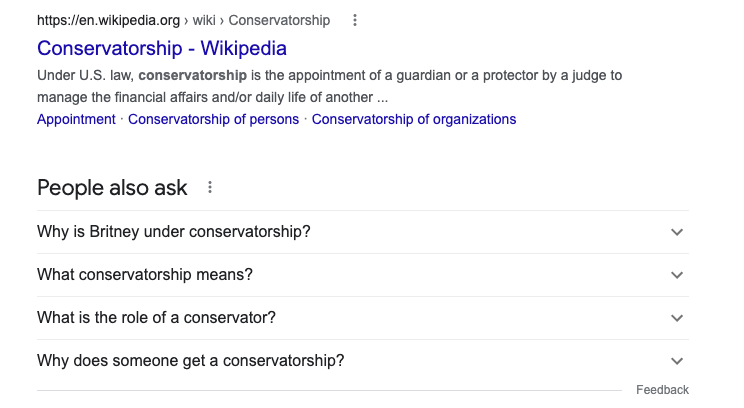

But when Britney was going through her legal drama in 2021, the top of the SERPs looked like this with the Top Stories feature taking priority:
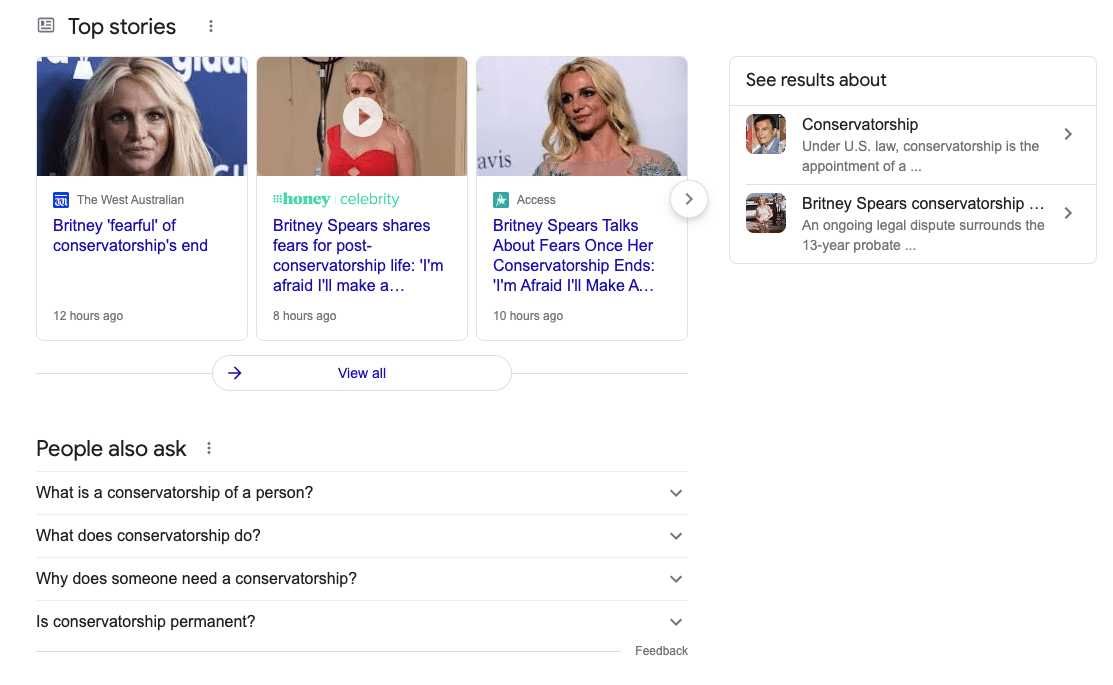

The Query Deserves Freshness (QDF) model is responsible for this. It’s a re-ranking model that changes SERPs at the last minute to deliver the most current information.
In situations like this, if your site remains on the SERPs and the content is relevant to the new intent, you may see a temporary traffic spike. However, if your content is not relevant to the new intent or it’s dropped from results altogether, that’s where you may experience traffic losses.
So, how do you respond if there’s an intent switch on your keywords?
- If you think it’s a QDF event that will pass: You could just wait it out until the rankings re-stabilize.
- If it’s a minor intent change or something that still aligns with your brand: You could update your content to reflect the shift.
- If the new intent does not align with your brand: There isn’t much action you can take. It’s best to be transparent with stakeholders about why traffic was lost and how reclaiming it is beyond your control. Instead, show where the new strategic benefits lie and how you’ll be pivoting the strategy.
Here’s another reason intent switches can happen: Google’s understanding of what users want improves
This is actually what happened in the gardening example I used above. Between both dates I checked, there’s been a predominant informational intent in the organic listings. However, Google shifted the features above the fold from prioritizing local services and gardening news to showcasing ecommerce products instead.


As Google gets better at understanding what people want, it will continue to make changes like this.
In this scenario, as it isn’t a QDF event that will pass, you either need to update your content to reflect the shift or admit defeat and communicate reasons for your traffic loss to stakeholders.
As users become more tech-literate and adept at using other platforms, their search behaviors and expectations change.
More people these days are bypassing Google and turning directly to other platforms like:
- ChatGPT for conversational searches
- YouTube for video content
- Reddit for user-generated responses
- TikTok for snackable, entertaining content
- Amazon for product searches
If Google wants to stay relevant, it needs to make changes that keep younger audiences engaged. As such, these changes can also lead to traffic declines that are beyond your control.
A prevalent example of this, taking place in SERPs right now, is how Google includes user-generated content and forum sites in prime organic positions. There was an announcement in 2022 launching the “Forums and Discussions” feature, but many changes have since been made to include more UGC content in SERPs.
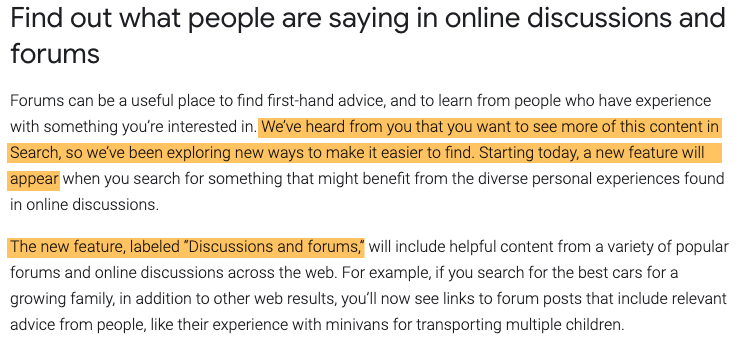

Sites like Reddit and Quora are now pinching traffic from digital publishers and niche site owners in millions of SERPs where they were not featured before.
Let’s look at Reddit’s traffic trend for the last two years in Ahrefs:
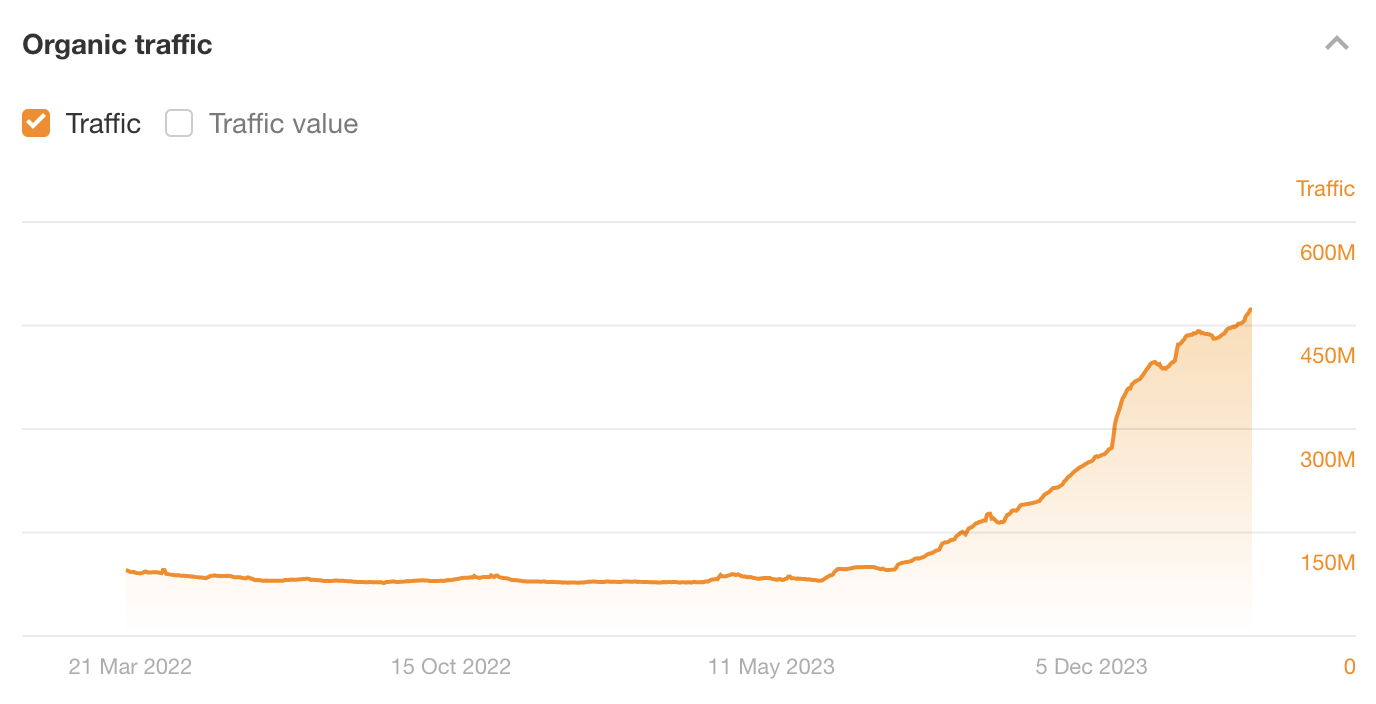

Overall, Reddit has seen a:
- 24.5% lift in organic keywords
- 81.5% lift in organic traffic
- 47% lift in its Top 3 keywords
- 87.2% lift in Traffic Value (this one blew my mind)
And Quora’s performance follows a similar pattern:
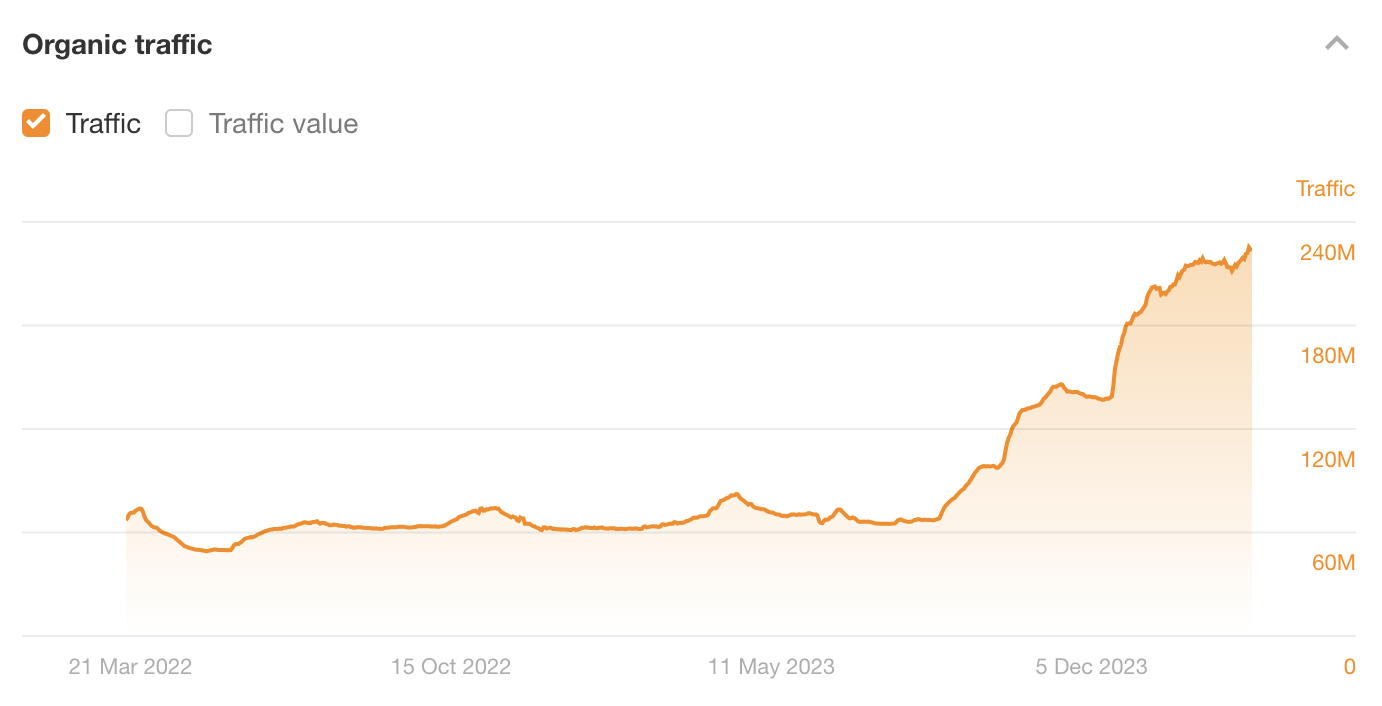

Quora has seen a:
- 16.7% lift in organic keywords
- 72.3% lift in organic traffic
- 26.7% lift in its Top 3 keywords
- 85.5% lift in Traffic Value
Unless Google makes a change, there’s no chance that publishers and brands that lost traffic will be able to reclaim it easily.
Now, it’s not always going to be the case that absolutely nothing can be done. I encourage you to think outside the box here and find creative ways to make winning content in the face of such changes.
For example, many SEOs are now posting on Reddit and leveraging Reddit’s existing rankings to get more eyeballs on their content.
Changes in user behavior can also often bring about opportunities for new content formats that are untapped and have very little competition. The aim of the game here is to adapt and show up where your audience is searching, even if that’s beyond Google.
SEO in its purest form is platform agnostic; it’s not just about Google, and I think many SEOs have forgotten this.
Final thoughts
In general, it’s best to hold off taking action until you’re certain of the root cause of your website’s traffic loss.
Tweaking your content or throwing links at a site rarely helps recover traffic you lost for any of the above reasons.
But if you feel like there’s more you can be doing, check out our guide on how to recover if your traffic has dropped dramatically.
If you’ve got any questions or have examples of other reasons why sites have lost organic traffic when it’s not their fault, feel free to share them with me on X or LinkedIn.
SEO
Google Rolls Out New ‘Web’ Filter For Search Results
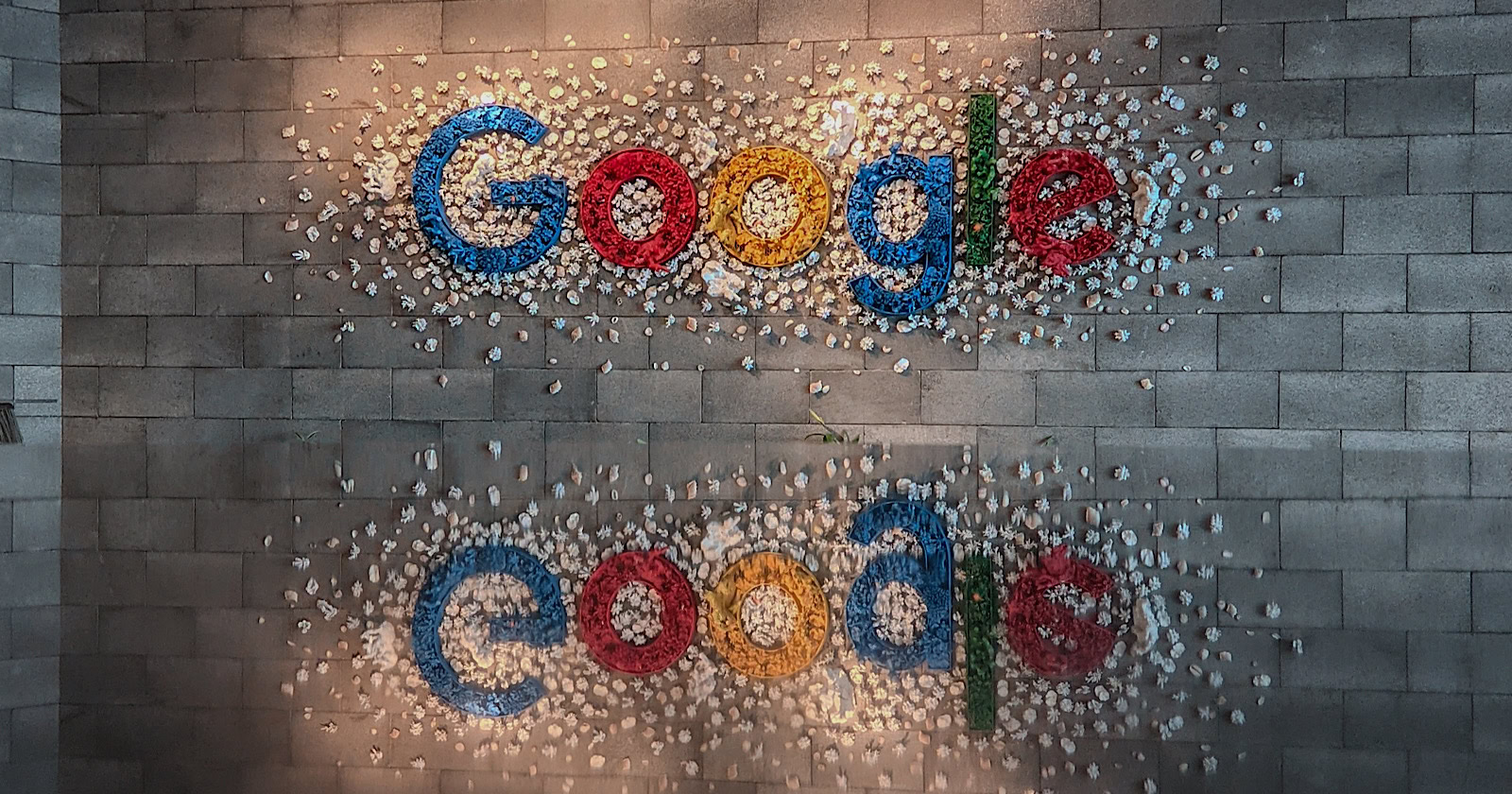
Google is introducing a filter that allows you to view only text-based webpages in search results.
The “Web” filter, rolling out globally over the next two days, addresses demand from searchers who prefer a stripped-down, simplified view of search results.
Danny Sullivan, Google’s Search Liaison, states in an announcement:
“We’ve added this after hearing from some that there are times when they’d prefer to just see links to web pages in their search results, such as if they’re looking for longer-form text documents, using a device with limited internet access, or those who just prefer text-based results shown separately from search features.”
We’ve added this after hearing from some that there are times when they’d prefer to just see links to web pages in their search results, such as if they’re looking for longer-form text documents, using a device with limited internet access, or those who just prefer text-based…
— Google SearchLiaison (@searchliaison) May 14, 2024
The new functionality is a throwback to when search results were more straightforward. Now, they often combine rich media like images, videos, and shopping ads alongside the traditional list of web links.
How It Works
On mobile devices, the “Web” filter will be displayed alongside other filter options like “Images” and “News.”
If Google’s systems don’t automatically surface it based on the search query, desktop users may need to select “More” to access it.
 Screenshot from: twitter.com/GoogleSearchLiaison, May 2024.
Screenshot from: twitter.com/GoogleSearchLiaison, May 2024.More About Google Search Filters
Google’s search filters allow you to narrow results by type. The options displayed are dynamically generated based on your search query and what Google’s systems determine could be most relevant.
The “All Filters” option provides access to filters that are not shown automatically.
Alongside filters, Google also displays “Topics” – suggested related terms that can further refine or expand a user’s original query into new areas of exploration.
For more about Google’s search filters, see its official help page.
Featured Image: egaranugrah/Shutterstock
SEO
Why Google Can’t Tell You About Every Ranking Drop

In a recent Twitter exchange, Google’s Search Liaison, Danny Sullivan, provided insight into how the search engine handles algorithmic spam actions and ranking drops.
The discussion was sparked by a website owner’s complaint about a significant traffic loss and the inability to request a manual review.
Sullivan clarified that a site could be affected by an algorithmic spam action or simply not ranking well due to other factors.
He emphasized that many sites experiencing ranking drops mistakenly attribute it to an algorithmic spam action when that may not be the case.
“I’ve looked at many sites where people have complained about losing rankings and decide they have a algorithmic spam action against them, but they don’t. “
Sullivan’s full statement will help you understand Google’s transparency challenges.
Additionally, he explains why the desire for manual review to override automated rankings may be misguided.
Two different things. A site could have an algorithmic spam action. A site could be not ranking well because other systems that *are not about spam* just don’t see it as helpful.
I’ve looked at many sites where people have complained about losing rankings and decide they have a…
— Google SearchLiaison (@searchliaison) May 13, 2024
Challenges In Transparency & Manual Intervention
Sullivan acknowledged the idea of providing more transparency in Search Console, potentially notifying site owners of algorithmic actions similar to manual actions.
However, he highlighted two key challenges:
- Revealing algorithmic spam indicators could allow bad actors to game the system.
- Algorithmic actions are not site-specific and cannot be manually lifted.
Sullivan expressed sympathy for the frustration of not knowing the cause of a traffic drop and the inability to communicate with someone about it.
However, he cautioned against the desire for a manual intervention to override the automated systems’ rankings.
Sullivan states:
“…you don’t really want to think “Oh, I just wish I had a manual action, that would be so much easier.” You really don’t want your individual site coming the attention of our spam analysts. First, it’s not like manual actions are somehow instantly processed. Second, it’s just something we know about a site going forward, especially if it says it has change but hasn’t really.”
Determining Content Helpfulness & Reliability
Moving beyond spam, Sullivan discussed various systems that assess the helpfulness, usefulness, and reliability of individual content and sites.
He acknowledged that these systems are imperfect and some high-quality sites may not be recognized as well as they should be.
“Some of them ranking really well. But they’ve moved down a bit in small positions enough that the traffic drop is notable. They assume they have fundamental issues but don’t, really — which is why we added a whole section about this to our debugging traffic drops page.”
Sullivan revealed ongoing discussions about providing more indicators in Search Console to help creators understand their content’s performance.
“Another thing I’ve been discussing, and I’m not alone in this, is could we do more in Search Console to show some of these indicators. This is all challenging similar to all the stuff I said about spam, about how not wanting to let the systems get gamed, and also how there’s then no button we would push that’s like “actually more useful than our automated systems think — rank it better!” But maybe there’s a way we can find to share more, in a way that helps everyone and coupled with better guidance, would help creators.”
Advocacy For Small Publishers & Positive Progress
In response to a suggestion from Brandon Saltalamacchia, founder of RetroDodo, about manually reviewing “good” sites and providing guidance, Sullivan shared his thoughts on potential solutions.
He mentioned exploring ideas such as self-declaration through structured data for small publishers and learning from that information to make positive changes.
“I have some thoughts I’ve been exploring and proposing on what we might do with small publishers and self-declaring with structured data and how we might learn from that and use that in various ways. Which is getting way ahead of myself and the usual no promises but yes, I think and hope for ways to move ahead more positively.”
Sullivan said he can’t make promises or implement changes overnight, but he expressed hope for finding ways to move forward positively.
Featured Image: Tero Vesalainen/Shutterstock
SEO
56 Google Search Statistics to Bookmark for 2024
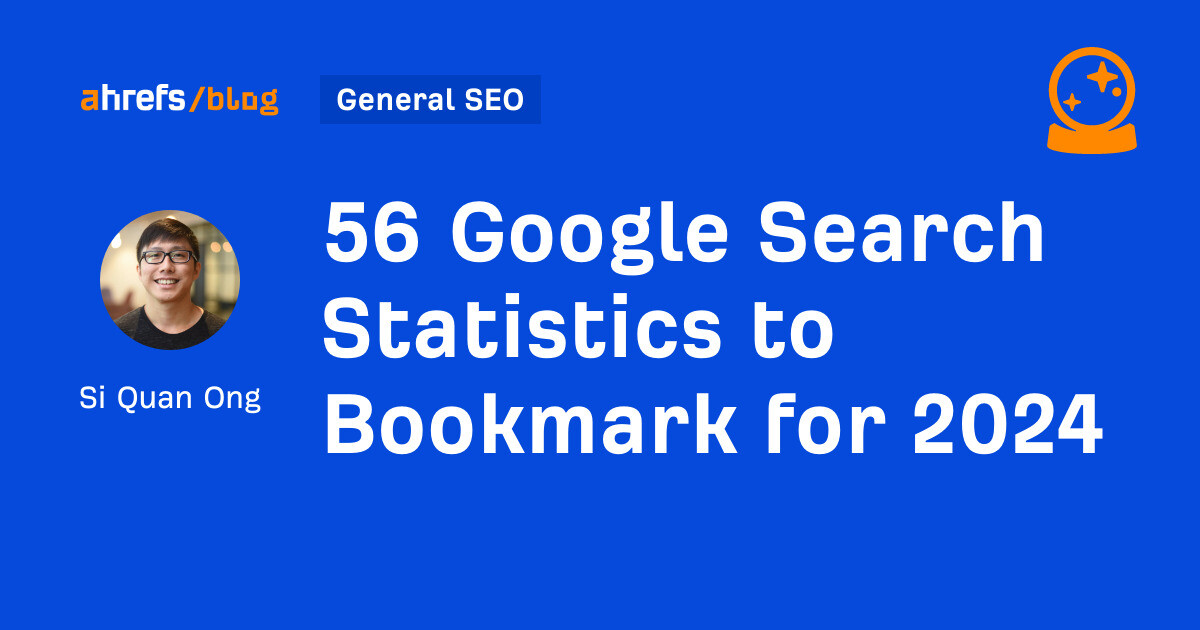
If you’re curious about the state of Google search in 2024, look no further.
Each year we pick, vet, and categorize a list of up-to-date statistics to give you insights from trusted sources on Google search trends.
- Google has a web index of “about 400 billion documents”. (The Capitol Forum)
- Google’s search index is over 100 million gigabytes in size. (Google)
- There are an estimated 3.5 billion searches on Google each day. (Internet Live Stats)
- 61.5% of desktop searches and 34.4% of mobile searches result in no clicks. (SparkToro)
- 15% of all Google searches have never been searched before. (Google)
- 94.74% of keywords get 10 monthly searches or fewer. (Ahrefs)
- The most searched keyword in the US and globally is “YouTube,” and youtube.com gets the most traffic from Google. (Ahrefs)
- 96.55% of all pages get zero search traffic from Google. (Ahrefs)
- 50-65% of all number-one spots are dominated by featured snippets. (Authority Hacker)
- Reddit is the most popular domain for product review queries. (Detailed)
- Google is the most used search engine in the world, with a mobile market share of 95.32% and a desktop market share of 81.95%. (Statista)
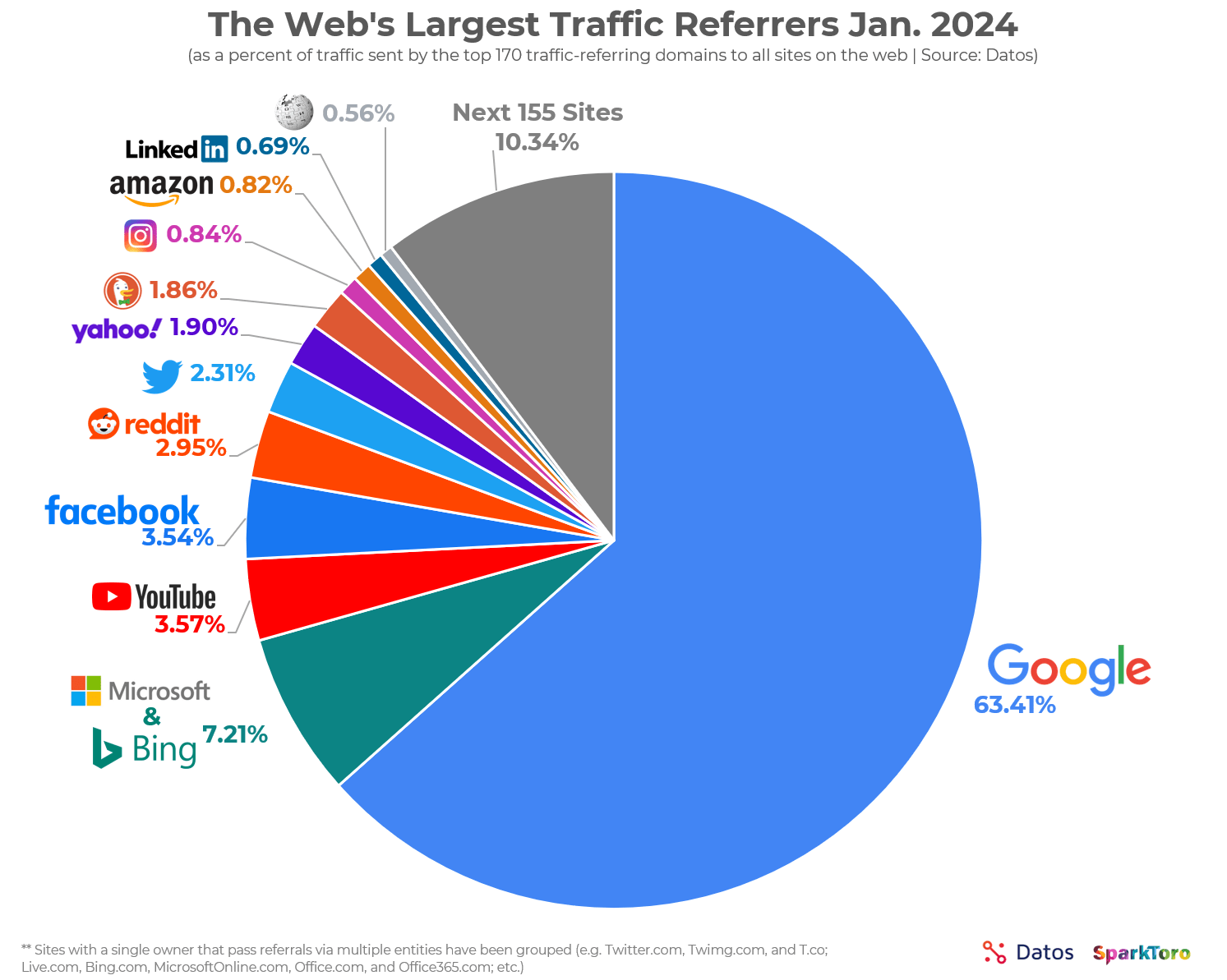

- Google.com generated 84.2 billion visits a month in 2023. (Statista)
- Google generated $307.4 billion in revenue in 2023. (Alphabet Investor Relations)
- 63.41% of all US web traffic referrals come from Google. (SparkToro)
- 92.96% of global traffic comes from Google Search, Google Images, and Google Maps. (SparkToro)
- Only 49% of Gen Z women use Google as their search engine. The rest use TikTok. (Search Engine Land)
- 58.67% of all website traffic worldwide comes from mobile phones. (Statista)
- 57% of local search queries are submitted using a mobile device or tablet. (ReviewTrackers)
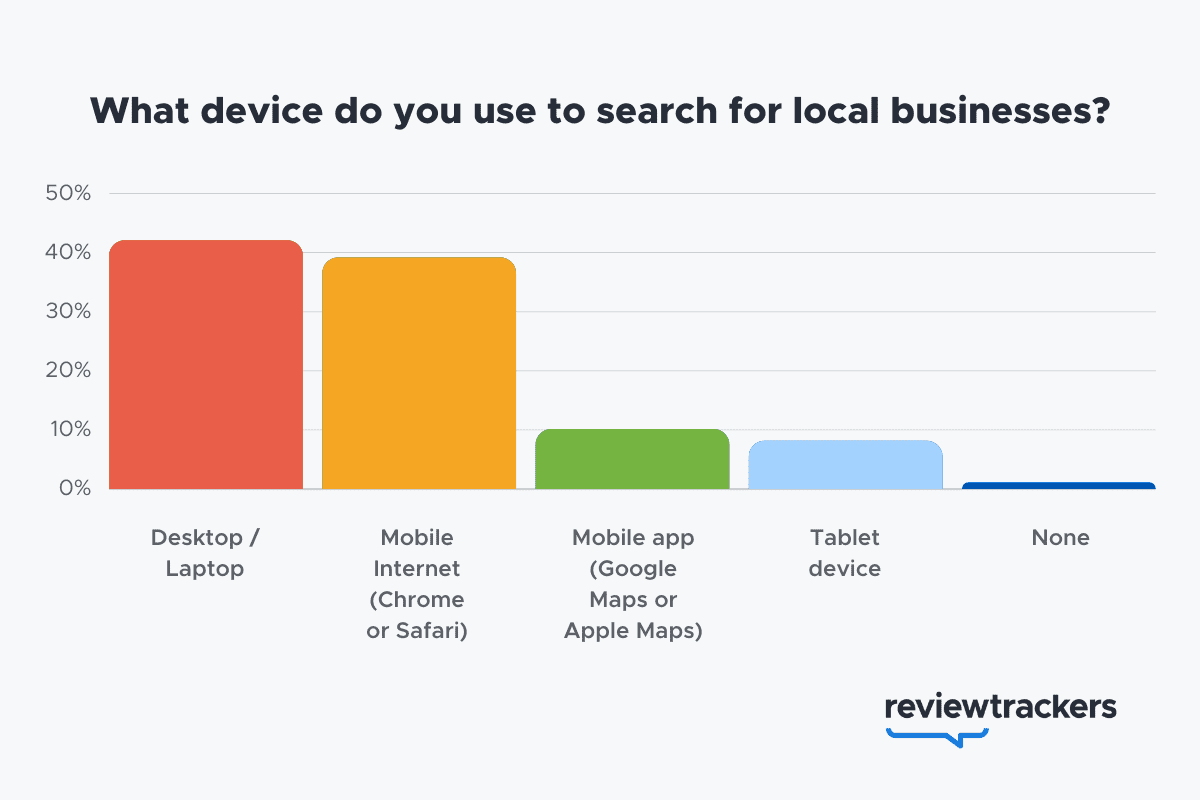

- 51% of smartphone users have discovered a new company or product when conducting a search on their smartphones. (Think With Google)
- 54% of smartphone users search for business hours, and 53% search for directions to local stores. (Think With Google)
- 18% of local searches on smartphones lead to a purchase within a day vs. 7% of non-local searches. (Think With Google)
- 56% of in-store shoppers used their smartphones to shop or research items while they were in-store. (Think With Google)
- 60% of smartphone users have contacted a business directly using the search results (e.g., “click to call” option). (Think With Google)
- 63.6% of consumers say they are likely to check reviews on Google before visiting a business location. (ReviewTrackers)
- 88% of consumers would use a business that replies to all of its reviews. (BrightLocal)
- Customers are 2.7 times more likely to consider a business reputable if they find a complete Business Profile on Google Search and Maps. (Google)
- Customers are 70% more likely to visit and 50% more likely to consider purchasing from businesses with a complete Business Profile. (Google)
- 76% of people who search on their smartphones for something nearby visit a business within a day. (Think With Google)
- 28% of searches for something nearby result in a purchase. (Think With Google)
- Mobile searches for “store open near me” (such as, “grocery store open near me” have grown by over 250% in the last two years. (Think With Google)
- People use Google Lens for 12 billion visual searches a month. (Google)
- 50% of online shoppers say images helped them decide what to buy. (Think With Google)
- There are an estimated 136 billion indexed images on Google Image Search. (Photutorial)
- 15.8% of Google SERPs show images. (Moz)
- People click on 3D images almost 50% more than static ones. (Google)
- More than 800 million people use Google Discover monthly to stay updated on their interests. (Google)
- 46% of Google Discover URLs are news sites, 44% e-commerce, 7% entertainment, and 2% travel. (Search Engine Journal)
- Even though news sites accounted for under 50% of Google Discover URLs, they received 99% of Discover clicks. (Search Engine Journal)
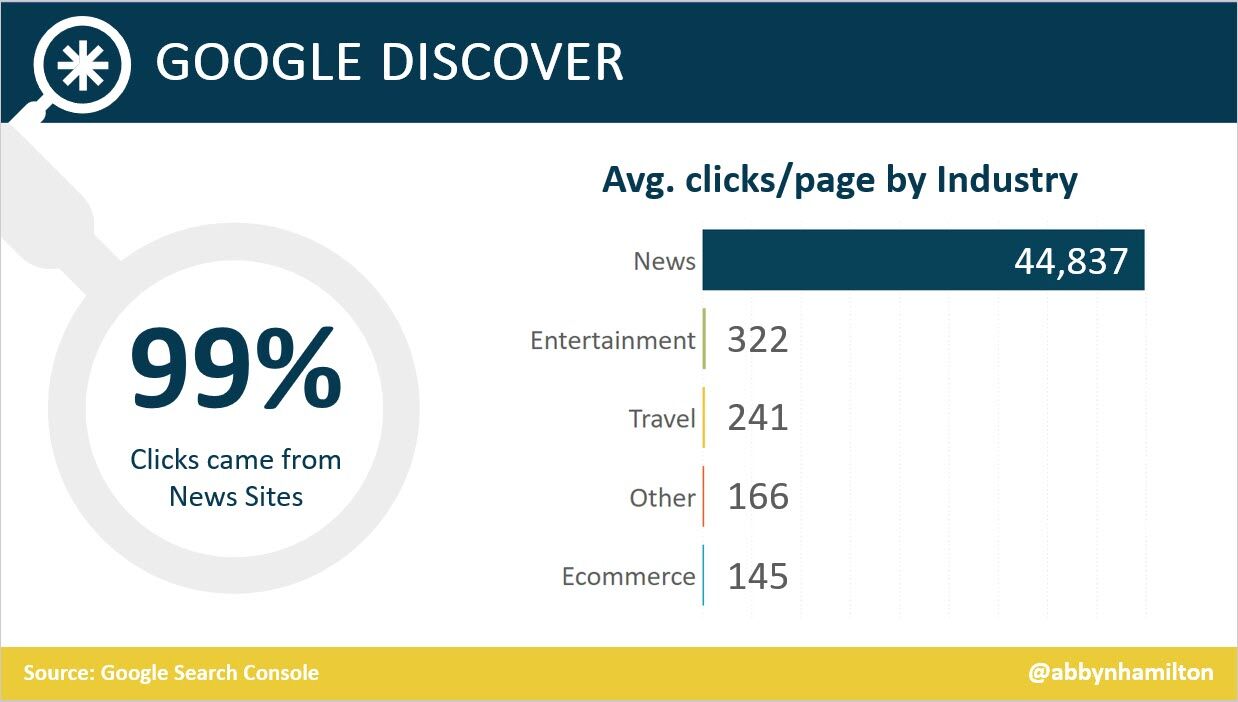

- Most Google Discover URLs only receive traffic for three to four days, with most of that traffic occurring one to two days after publishing. (Search Engine Journal)
- The clickthrough rate (CTR) for Google Discover is 11%. (Search Engine Journal)
- 91.45% of search volumes in Google Ads Keyword Planner are overestimates. (Ahrefs)
- For every $1 a business spends on Google Ads, they receive $8 in profit through Google Search and Ads. (Google)
- Google removed 5.5 billion ads, suspended 12.7 million advertiser accounts, restricted over 6.9 billion ads, and restricted ads from showing up on 2.1 billion publisher pages in 2023. (Google)
- The average shopping click-through rate (CTR) across all industries is 0.86% for Google Ads. (Wordstream)
- The average shopping cost per click (CPC) across all industries is $0.66 for Google Ads. (Wordstream)
- The average shopping conversion rate (CVR) across all industries is 1.91% for Google Ads. (Wordstream)
- 58% of consumers ages 25-34 use voice search daily. (UpCity)
- 16% of people use voice search for local “near me” searches. (UpCity)
- 67% of consumers say they’re very likely to use voice search when seeking information. (UpCity)
- Active users of the Google Assistant grew 4X over the past year, as of 2019. (Think With Google)
- Google Assistant hit 1 billion app installs. (Android Police)
- AI-generated answers from SGE were available for 91% of entertainment queries but only 17% of healthcare queries. (Statista)
- The AI-generated answers in Google’s Search Generative Experience (SGE) do not match any links from the top 10 Google organic search results 93.8% of the time. (Search Engine Journal)
- Google displays a Search Generative element for 86.8% of all search queries. (Authoritas)
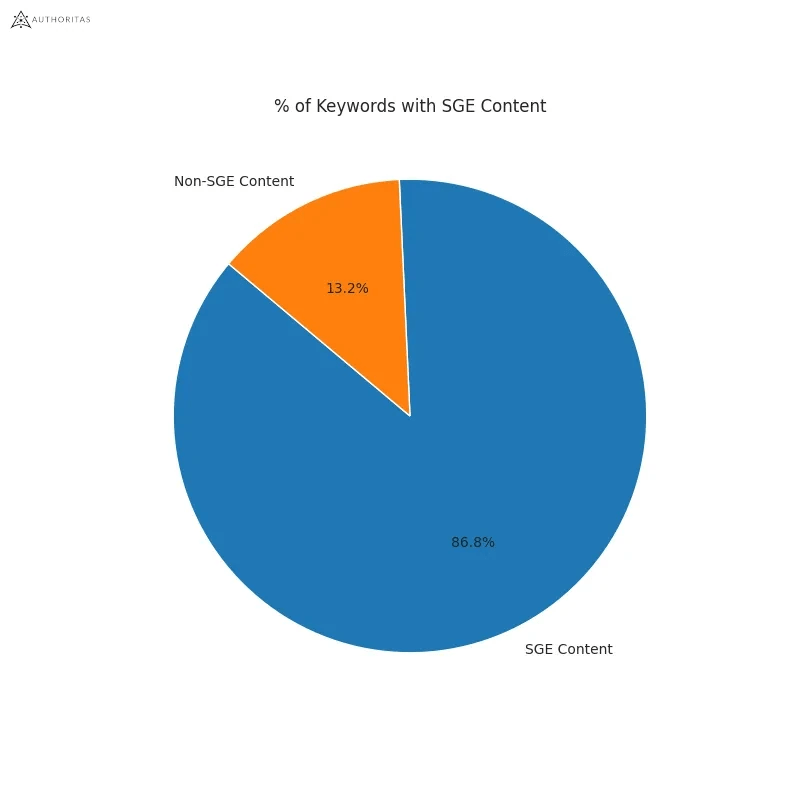

- 62% of generative links came from sources outside the top 10 ranking organic domains. Only 20.1% of generative URLs directly match an organic URL ranking on page one. (Authoritas)
- 70% of SEOs said that they were worried about the impact of SGE on organic search (Aira)
Learn more
Check out more resources on how Google works:
-

 PPC7 days ago
PPC7 days agoHow the TikTok Algorithm Works in 2024 (+9 Ways to Go Viral)
-

 SEO6 days ago
SEO6 days agoHow to Use Keywords for SEO: The Complete Beginner’s Guide
-

 MARKETING7 days ago
MARKETING7 days agoHow To Protect Your People and Brand
-
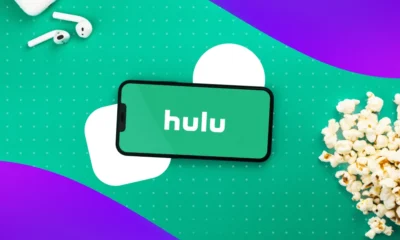
 MARKETING4 days ago
MARKETING4 days agoAdvertising on Hulu: Ad Formats, Examples & Tips
-

 MARKETING5 days ago
MARKETING5 days agoUpdates to data build service for better developer experiences
-

 MARKETING1 day ago
MARKETING1 day ago18 Events and Conferences for Black Entrepreneurs in 2024
-

 MARKETING6 days ago
MARKETING6 days agoThe Ultimate Guide to Email Marketing
-

 WORDPRESS4 days ago
WORDPRESS4 days agoBest WordPress Plugins of All Time: Updated List for 2024


